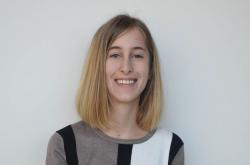She was one of the first African-American students to graduate from Georgia Southern University in 1970, then called Georgia Southern College.
Clavelia Love Brinson, known by many of her fellow students and professors as “Sherry,” had made her career as a health and physical education teacher and a school administrator in Jacksonville, Florida. After moving back to Statesboro in 2011, she did not return to campus until 2013.
“I didn’t come back to this campus until Soledad O’Brien was talking …I haven’t been on this campus, in this gym, since 1970,” Brinson said.
Her challenges during college
Brinson originally wanted to go to Tuskegee University, but her family didn’t have money for that, nor did she receive any scholarships from the Alabama university.
“I said, ‘Well, I’m going to go to school, and I want that piece of paper that says that I can work and earn a decent living,’” Brinson said.
She applied to GS in the summer of 1965, whereby she was accepted and started school in the fall quarter. Though she said that her mother felt fearful about Brinson’s safety at the college, Brinson was determined to go to school.
“We had no money, and they [GS] wouldn’t give me a scholarship of any kind,” Brinson said. “So I worked, and it was $175 a quarter for me to go to classes.”
She took other measures to save money, such as living at home, often eating at home and bringing her own lunch to school.
Many of the students, particularly freshmen and sophomores, were not kind to Brinson when she took classes at GS. She cited the frequent experience of students driving by her in their cars and called her expletives, telling her to go home.
“I got to the point where I said ‘Come back, stop right here and ask me that,’” Brinson said. “When I left [Georgia] Southern, I always told people I had a rock the size of Gibraltar on my shoulder, because I listened distinctly to how people asked me things, or told me things, and I was very quick to say ‘What did you mean by that?’”
She elaborated that when she changed her major from pre-nursing to health and physical education, Frank Ramsey, Ph.d. taught one of the first classes she had to take.

On the first day of the class, Brinson said that Ramsey asked her, “Sherry, what the hell are you doing in here?”
She explained that she changed her major to health and physical education, so she needed to take the classes and two other classes from him.
Ramsey, said Brinson, said that he wished she had not changed her major, because he thought that black women should pursue learning things like how to cook, clean and have babies. Brinson explained that the taunts became worse, as Ramsey picked on her every class.
The situation came to a head when, after studying with one of the smarter students in the class, Brinson said that she got a score of 48 on her test, compared to the other student’s 110. She told Ramsey in class that she wanted to talk to him during his office hours.
“He said, ‘I don’t have time for you to do that,’” Brinson said.
The other students convinced Ramsey to schedule an appointment with Brinson. The day of the appointment, a Friday, Brinson arrived at Ramsey’s office. The professor was talking to the tennis team in the immediate minutes before the appointment.
Brinson made eye contact and waited in the outside hall until 1 p.m., the time Ramsey suggested in class, passed.
When he finished his previous discussion, around 1:10 pm., Brinson said that Ramsey told her, “Get your black ass out of my office, and don’t you ever come back here again.”
A shocked Brinson walked out of the office, passing health and physical education chair Doyice Cotton, Ph.D. in the hallway. Cotton saw Brinson looked distraught and asked what was wrong.
When Cotton offered that they go into his office to talk, Brinson explained her situation, but made clear to Cotton that she did not want him to talk with Ramsey because she had more classes to take from Ramsey.
“I don’t know what happened, but senior health and physical education majors called for a meeting,” Brinson said. “President Henderson was there. All of the health and physical education teachers were there.”
The seniors who had called for the 1969 meeting were there. Many of them were members of Gamma Phi Epsilon, a campus professional organization for health and physical education majors.
“I think Sandra Ray or Claudia Whaley was talking, and they said, ‘We called this meeting because we will not attend another class from Dr. Ramsey. Either you get somebody else to teach it, or we will transfer our credits to the University of Georgia and finish our degree.’”
The senior then said, according to Brinson, that Ramsey did not like women majors in the department or black students, so Brinson had it twice as bad.
“And he [President Henderson] said ‘Sherry?’,” Brinson said. “I said, ‘Well, you know my situation. I can’t do anything right in that class.’”
Her saving graces
From that meeting, the university recruited Tom Paul, Ph.d, from New York, and Brinson retook two of the classes she had been taking with Ramsey.
That was not the only time that Henderson helped Brinson with a class-related issue. When Brinson took a college algebra class as a junior, the professor accused her of cheating her way to the answers for some mathematical induction problems.
“He said, ‘Clavelia, I don’t know how the hell you did it, but you cheated. There’s no way in way’s hell for you to know that,’” Brinson said.
So, Brinson gathered her belongings and walked over to President Henderson’s office, because she knew Henderson would listen to her.
The secretary there said Henderson was busy, so Brinson waited for a couple of hours. After the secretary went out for lunch around 11:30, Henderson came out to put something on the secretary’s desk.
“He said, ‘Young lady, you’ve been here. May I help you?,’” Brinson said. “I said, ‘I hope you can.’”

Brinson asked for paper and pencil and then showed Henderson she could do the mathematical inductions problems her class was learning. She told the president that despite that knowledge, her professor thought she cheated.
“President Henderson picked up the phone and called the controls office,” Brinson said, “and he said ‘Take Clavelia Sherry Brinson out of math. Give her credit, and she will not take another math class on this campus.’”
Brinson also elaborated on the helpfulness of Doyice Cotton, the professor who helped Brinson with the previously mentioned prerequisite classes. He helped her sign up for other classes, too.
“I could go to him and talk to him and tell him what I’ve taken, what happened and what I need to take again,” Brinson said. “He would have to sign it [a form].”
Outside of Georgia Southern College, Brinson often confided in Martha Riggs, a woman who lived in the projects near Brinson’s family.
“I would go home crying, and she would say, ‘Tell me anything except about English [which Brinson failed three times],’” Brinson said. “’Just tell me about the rest and take it again, baby. You’ll be alright.’”
Riggs encouraged Brinson to pray and, if she needed to, cry, but then get up and try again. Indeed, Brinson added that she did cry, almost every day. However, she would often recall something that her grandmother told her.
“I had a cross that my grandmother gave me, and she said, ‘God isn’t going to allow them to give you any more than you and he can handle,’” Brinson said.
Extracurriculars
Aside from her classes, Brinson participated in several kinds of extracurricular activities through the college. One of her highlights was participating in Gamma Phi Epsilon. She got to do things like play campus intramurals and attend the state meeting for Gamma Phi Epsilon at Jekyll Island.
“Jekyll Island was all white at that time,” Brinson said. “Blacks were not allowed at that end of the island. Dr. Clements and J.B. Scarce and Dr. Cotton said, ‘You have to go, Sherry. You have to go.’”
Brinson explained that out of the 10 majors required to be in the meeting room, four people had to sign documentation confirming their attendance.
“I had to sign, because everyone would want to know where I was,” Brinson said. “Where’s the black girl? Where’s the black girl?”
She enjoyed going to the state meetings after a while, particularly because the upperclassmen were very nice to her.
In addition to Gamma Phi Epsilon, Brinson also participated in a creative dance group and the Methodist student union.
Graduation
Brinson mentioned that following the difficulties she had with Ramsey, the professors would often stutter and mispronounce her first name.
When it came time for graduation, Brinson’s mother mused that perhaps administrators would pronounce Clavelia’s name correctly this time.

Courtesy of 1970 Reflector.
“Dr. Hawk was over the education department, and he said, ‘Clavelia Love Brinson,’” Brinson said. “She’s like, ‘Go ahead, go ahead, go ahead.’”
“He [Hawk] pulled me up on stage and said, Sherry, I’m so proud of you. He said I’m proud of you,’” Brinson said.
President Henderson asked Brinson to give him a hug and also said that he was proud of her.
“I said, ‘I’m proud of myself, Doc,’” Brinson said.
When Brinson left the graduation, she looked at her diploma and, after marveling at it, told her mother she would be back in a minute. Her mother asked where she was going, to which Brinson replied that she would go visit Ramsey one last time.
Upon going to his office, Brinson saw that he had his door cracked because he was working on something at his desk. When she pushed the door open, he said one word: Sherry.
“I said, ‘I got my black ass in your office one more time, for the last time,’” Brinson said. “‘I have this degree in spite of you.”
Though Ramsey replied that she earned it, Brinson commented that she had earned the degree threefold because of the difficulties he caused her.
“I said, ‘But I could not leave this campus without telling you that I hate you,’” Brinson said. “My grandmama said ‘Don’t hate nobody,’ but I think you have a problem. Either some black woman has hurt your heart and told you where to go, or there’s somebody in your ancestral line blacker than me.”
Her mother was in disbelief when Brinson recounted the story to her, but Brinson maintained that she felt better for seeking that kind of resolution.
“In the army [reserves], they taught me ‘You can. You will,’” Brinson said. “The army is where I got rid of all of that anger and being mad and upset the way people asked you to do things.”
As for the state of race relations now, Brinson seemed to think that positive changes have been made with students getting along and going to their classes without that much negativity.
“I know one student in the nursing program, and he said that he has interactions with his teachers just fine,” Brinson said. “And I think that’s far different from when I was [at GSC].”
Brandon Wright, Ben Barks and Franchette O’Neal contributed reporting.





